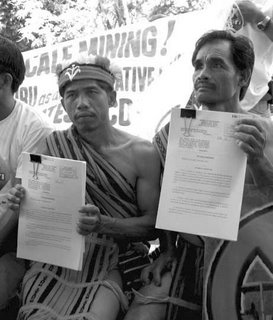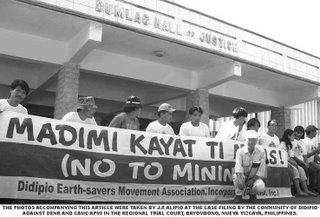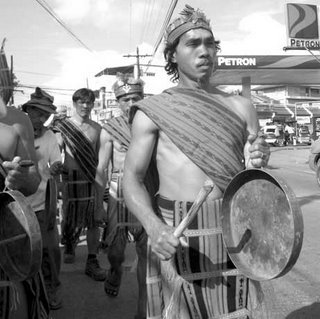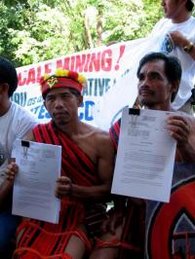First posted 02:57am (Mla time) July 18, 2006
By Melvin Gascon
Inquirer
http://news.inq7.net/archive_article/index.php?ver=1&index=1&story_id=10378Editor's Note: Published on Page A13 of the July 18, 2006 issue of the Philippine Daily Inquirer
BAYOMBONG, NUEVA VIZCAYA—For the first time in more than a decade, residents of a small mining village in upland Kasibu town have agreed to come together to discuss the issues that have divided their community.
The National Commission on Indigenous Peoples on Friday convened villagers opposed to and in favor of a proposed large scale mining project in Barangay Didipio to begin a series of dialogues meant to unite their village.
Victor Calingayan, NCIP provincial director, said that with the dialogues, the villagers would trace the roots of disputes that have escalated since Australasia Philippines Mining Inc. (Apmi) began pushing its planned gold-copper venture there.
“This is the first time that they (the pro- and antimining groups) have come together, talked things over and ate their meals with one another. I am confident that this would be the start of bringing back their unity as a community,” he said.
Apmi’s $102-million gold-copper project aims to process about 4 million ounces of gold and 1.5 billion ounces of copper deposits in Didipio for 14 years.
The proposed project has, however, failed to start operations due to objections of the local communities, led by the Didipio Village council and the Kasibu town council.
DivisionCalingayan said they held the dialogue after they noted the growing division among the tribal people of Didipio, composed of Ifugao, Kalanguya, Ibaloi and Bugkalot settlers.
“This mining issue has placed even family members and relatives on opposite sides. So we’re coming in to pacify them, so that the situation would not worsen,” he said.
The dialogue was held using the “ammungan,” or the traditional method of settling disputes among Cordillera tribes, according to Calingayan.
Under this practice, the villagers sat down together, let out their sentiments and discussed issues by themselves, with government leaders as observers.
The forum was held without the usual protagonists—Apmi officials and environment groups—to allow the tribes to talk freely and avoid outside influence, said Marilou Gilo-Abon, president of Nueva Vizcaya State University, host of the event.
Mending bridges“It is heartening to see them sit together and tell each other things that they have long wanted to say. I call this activity ‘mending bridges’,” said Abon, an adopted tribal member.
At the dialogue, about 80 Didipio villagers exchanged views on the issues. The pro-mining group was led by Pastor Efren Bulawan and some residents hired by Apmi as community relations employees.
The antimining group was led by village chair Antonio Dingcog, council member Peter Duyapat, and the officers of the Didipio Earthsavers Movement Association, a non-government organization.



